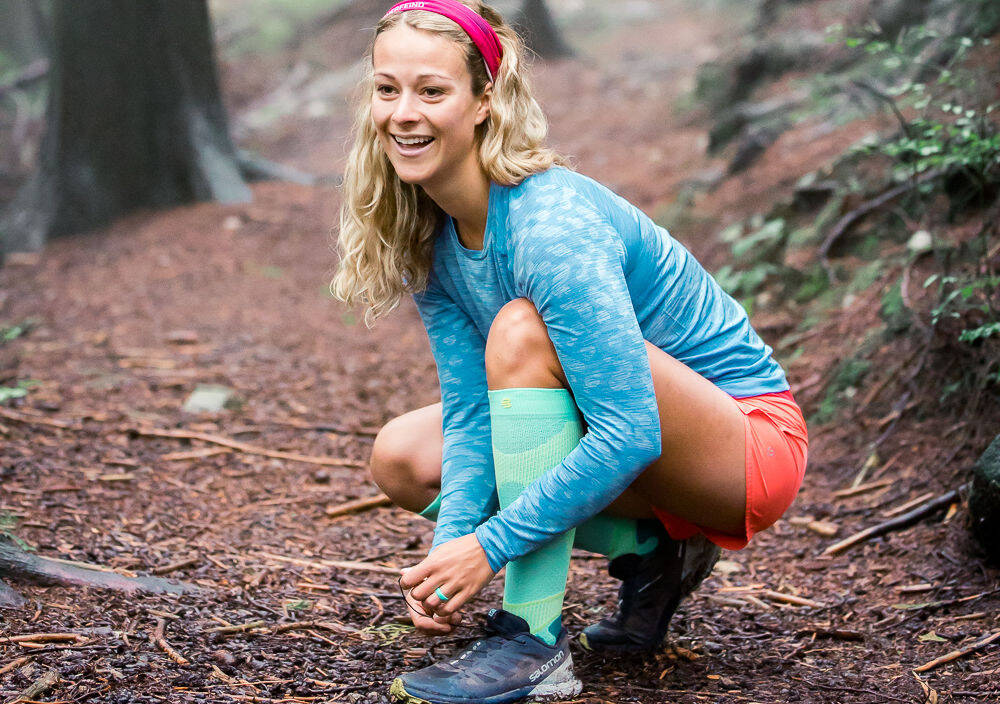Trail Running Gear
Nov 17, 2020
Hailey van Dyk is a Canadian ultra runner, blogger and nurse from British Columbia. In 2019 we collaborated with her for our story about her Himalayan tour with trekking partner Hilary Matheson.
As a practiced outdoor athlete, Hailey is poised to share her trail running experiences. In this interview, she tells us about her passion for the sport, which things are indispensable on a long tour and the tips she has for anyone just beginning with trail running.

If you had to describe trekking in three words, which would these be?
Hailey Van Dyk: Adventure, exploration, curiosity
How do you usually come up with ideas for new destinations?
A lot of times, I spend time researching trip reports of areas I would like to go. I much prefer venturing to places that are a little off the beaten path. For our recent Nepal trip, my travel partner Hilary had seen beautiful photos in a running magazine of the Upper Mustang area. Once we started researching the area, we realized how truly remote and untraveled it was. The excitement of venturing off the beaten path is always enticing to me.
"The excitement of venturing off the beaten path is always enticing to me."
Let’s talk about the right trekking gear. Which things do you pay special attention to when preparing for trekking tours?
I would say there are three really important gear pieces for trekking.
- Shoes: The right footwear will make or break a trek. Making sure you have a pair of shoes that is all together supportive, comfortable and the right fit is one of the most important things you can do before heading out on your trek. I personally like more of an approach style shoe versus a hiking boot because I find them lighter weight and more comfortable. Other people may prefer the added support a hiking boot offers.
- A good pack: Like shoes, packs must fit well too. You are carrying everything you need for the trek in your backpack, make sure it fits well.
- Trekking poles: When used correctly, trekking poles can make a huge difference for your trek. They help distribute the weight of your pack and the load on your legs which is really important, especially if you are trekking in mountainous terrain or for long distances.
How about your outdoor clothing? What do you wear?
I prefer lightweight trekking gear. I like to wear shorts and a t-shirt in the summer. A t-shirt for me is much better than a tank top because often times your pack digs into your shoulders and can be quite painful with the straps of a tank top. I love using merino wool products, especially for longer treks. They are lightweight, moisture-wicking and dry rally quickly. They are also thermal regulating and often repel odors… a great idea for long treks where you opt-out of bringing multiple changes of clothes.
How about food and drink: what should you take with you, what can you buy/get on your trip? (How) Do you cook?
This really depends on where you are going. For example in Nepal, we hardly had to bring food because each place we stayed in tea houses and the price of lodging often included your meal as well.
For treks to remote locations, a stove is part of the essential gear you should be bringing. There are lots of different brands of dehydrated meals and they often taste really good. For most of them, the only prep needed is boiling water and adding it to the package and letting it cook while you soak in the views.
"For treks to remote locations, a stove is part of the essential gear you should be bringing."
As a nurse, you know the advantages of compression products in the medical sector. In which way is compression gear also helpful for long trekking tours?
Compression products are such an awesome tool to use for recovery. Putting on compression socks or sleeves after a long day of trekking will help increase blood flow to the muscles and thus speed up recovery. The thing that is going to work the hardest during a trek is your legs, so why not use something that is going to help keep them happy?
Where would you still like to go?
Everywhere I haven’t been!! The world is such a diverse place and I would love to continue to explore my own backyard but also the mountains of the planet. My favourite places are the mountains so most of my adventures seem to gravitate towards them!

Which are the three most important tips you would give trekking beginners?
- Bring good snacks! There is nothing better than getting to the end of a tough day and then digging into your back and pulling out an awesome cookie. It can keep you excited too when you are feeling yourself fading.
- Invest in the right gear! Whatever you can do to make trekking more comfortable, do that, so you can enjoy it more!
- Go with friends! There is nothing better than enjoying absolutely astonishing places with good friends by your side. Create memories, savour the moment and explore places you always dreamed of!!
Tags


